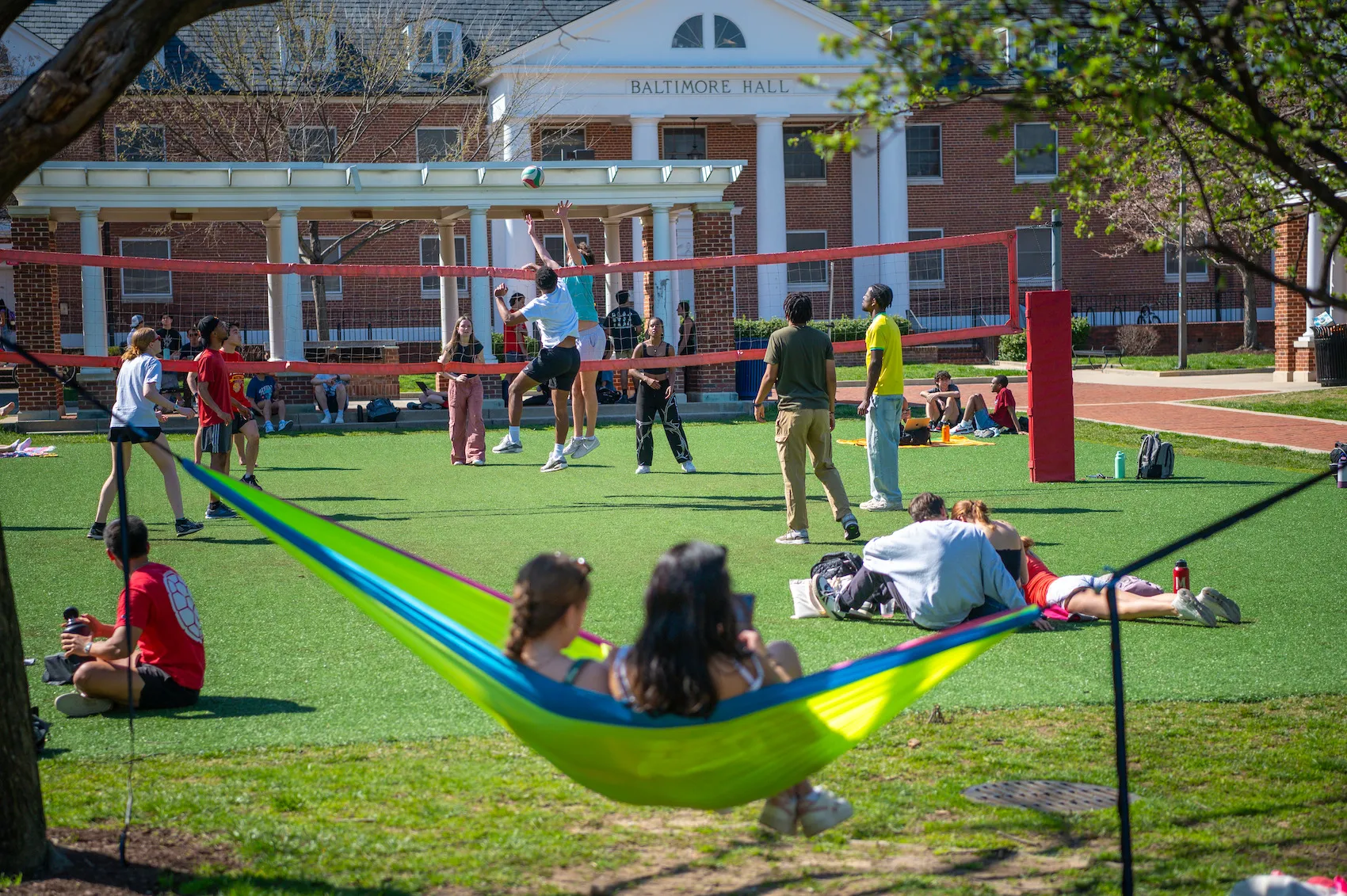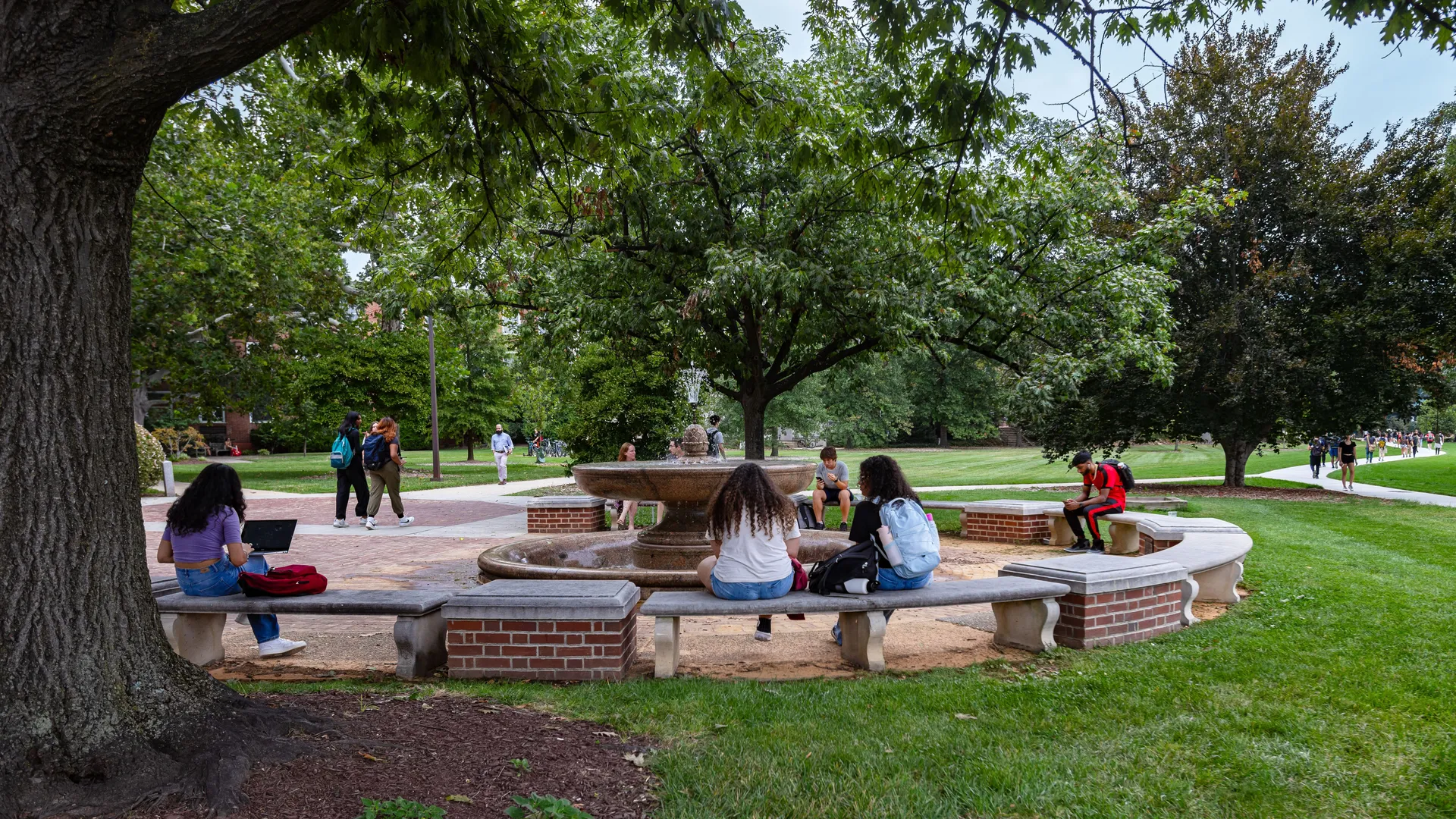For Undergraduate & Graduate Students

UMD provides resources to undergraduate and graduate students to meet their diverse mental health and wellness needs. Browse the resources below to find free and low-cost mental health treatment, essential needs support and campus programs to meet your wellness needs.
Mental Health Treatment
How can we help?
WELLNESS RESOURCES
Wellness has many dimensions. UMD has resources to support every Terp's unique situation and wellness needs.

I am looking for resources to help me...
Understand stress and my emotions
Emotional wellness is an awareness and understanding of our feelings, and the ability to adjust to life's ups and downs. Many factors contribute to our emotional wellness, including:
- Identifying, expressing and validating a wide range of emotions
- Establishing boundaries
- Managing stress
- Empathizing with others and practicing compassion
- Asking for help
Resources:
Find my community and connect with fellow Terps
Social wellness is developing and nurturing positive and inclusive relationships with people and our community. Many factors contribute to our social wellness, including:
- Being aware of our social and cultural backgrounds
- Understanding the depth and diversity in others
- Building a strong social support network
- Creating inclusive spaces
- Communicating effectively with others
- Contributing to our community
- Advancing causes for social good
- Engaging in acts of kindness
- Positively influencing our social environment by being antiracist, inclusive and challenging our personal biases
Resources:
- TerpLink: A student database where you can search for organizations that match your interests
- Terrapeers connects new students with fellow Terps
- Nyumburu Cultural Center
- LGBTQ+ Equity Center
- Multicultural Involvement & Community Advocacy (MICA)
- Thrive Center for Essential Needs
- Veteran Student Life
- Graduate Student Life
- International Student & Scholar Services (ISSS)
- Terps for Recovery
- Multicultural Involvement & Community Advocacy Student Involvement Resources
Adopt healthy habits for my body
Physical wellness is adopting health enhancing habits to care for our unique and diverse bodies. One can improve their physical wellness by:
- Seeking routine, preventative and trusted medical care
- Prioritizing sleep and rest
- Eating a variety of foods that fuel our bodies and minds, as well as honor our personal beliefs, values and customs
- Engaging in physical activity and movement that feels good for our bodies
- Engaging in harm reduction strategies
Resources:
- University Recreation & Wellness (RecWell), including personal and small group training, intramural sports, club sports, group fitness, aquatics and swimming lessons and athletic training
- Adventure Program (trips, climbing, bike shop, gear rental and more)
- Aquatics and Swimming Lessons
- Club Sports
- Golf
- Fitness (group fitness classes, personal training and more)
- Intramural Sports
- Injury Prevention & Care
- University Health Center services, including:
Succeed in my classes and explore fearless ideas
Intellectual wellness is exploring new ideas, being a life-long learner, and seeking a deeper understanding of different perspectives. One can improve their intellectual wellness by:
- Engaging in respectful and inclusive interactions
- Participating in mentally stimulating and creative activities
- Thinking critically and reasoning objectively
- Expanding professional and personal knowledge
- Being curious
- Trying new things
- Learning in ways that most suit us
Resources:
- Directors of Undergraduate Studies: Students who have concerns about a class should work directly with their instructor to resolve the issue. If they are unable to reach resolution with the instructor, students may consult the Director of Undergraduate Studies (DUGS) in the department or unit that offers the course, who can provide assistance. DUGS are knowledgeable about policy and work closely with instructors in their unit to resolve concerns. If you need assistance, please see the list of DUGS to find the right person to contact.
- Tutoring and Academic Success
- Academic Advising
- Course-Related Policies
- Accessibility and Disability Service
- Undergraduate Ombuds
- Student Academic Resources
- The Writing Center
- Research Services at the Library
- Office of Multi-Ethnic Student Education
- Support from other Terps:
- Creative Expression
Manage my finances and expenses
Financial wellness is managing resources in ways that align with our personal values, diverse needs and unique circumstances. One can support their financial wellness by:
- Making informed financial decisions and investments
- Supporting causes we care about
- Learning skills to manage resources within our means
- Setting realistic financial goals
- Preparing for short-term and long-term needs
Resources:
- Thrive Center for Essential Needs provides support for food security, stable housing, financial empowerment and well-being.
- The Student Crisis Fund provides compassionate aid to students experiencing emergencies.
- The Campus Pantry helps students experiencing food insecurity.
- Office of Student Financial Aid
- The Terp to Terp Campus ReUse Store collects donations and distributes kitchen items, clothing and school supplies for free to students in need.
- For financial management strategies, Financial Education Workshops are provided through the M&T Bank in Stamp Student Union.
Find my career, internships, and service opportunities
Vocational wellness is preparing for and engaging in meaningful work, life and leisure that is consistent with our values, goals and lifestyle. One can strive for occupational wellness by:
- Engaging in personal and professional development
- Assessing personal satisfaction and performance in our work and activities
- Maintaining a healthy work-life integration
- Creating an inclusive workplace culture
- Engaging in acts of service
Resources:
- Career:
- Self-Assessment:
- Internships
- Volunteer and Community Service
Better understand my spirituality
Spiritual wellness is seeking meaning and purpose in life and honoring our personal beliefs. One can improve their spiritual wellness by:
- Fostering a connection with something larger than ourselves
- Holding beliefs and values that guide our actions
- Respecting religious traditions
- Practicing gratitude
- Connecting mind, body and soul
- Seeking harmony with the universe
- Engaging in meditation
Resources:
- Meditation
- Mindful Moments Walking Tour
- The Memorial Chapel serves as an interfaith space on campus
- 14 Recognized Chaplaincies which represent diverse faith traditions
- McKeldin Library Reflection Space
- Garden of Reflection and Remembrance
Make an impact on my world
Environmental wellness is appreciating and understanding the interconnectedness between ourselves and our social, natural, digital and built environments, and striving to make a positive impact. One can strive for environmental wellness by:
- Respecting and protecting our natural environment through sustainable practices
- Enjoying time in nature
- Improving living conditions and access to resources
- Protecting ourselves and others from environmental hazards
Resources:
Building Skills for Myself and Other Terps
Wellness is a habit. At UMD, we want our Terps to feel empowered to create a culture of wellness within themselves and with others.

Drop-in virtual sessions on coping, relationships, academic success and more
Mental Health First Aid teaches you how to identify, understand and respond to signs of mental illness and substance use disorders.
Tips to support the wellness of your community
The University Health Center offers experiential learning opportunities for undergraduate students hoping to educate, serve and improve the wellness of the University of Maryland community.
UMD offers a wide range of courses related to wellness, peer education, mental health advocacy and more.

Graduate Student Resources
Graduate students face unique challenges. The Graduate School and units across campus are here to support graduate students as students, teachers, family members and more.